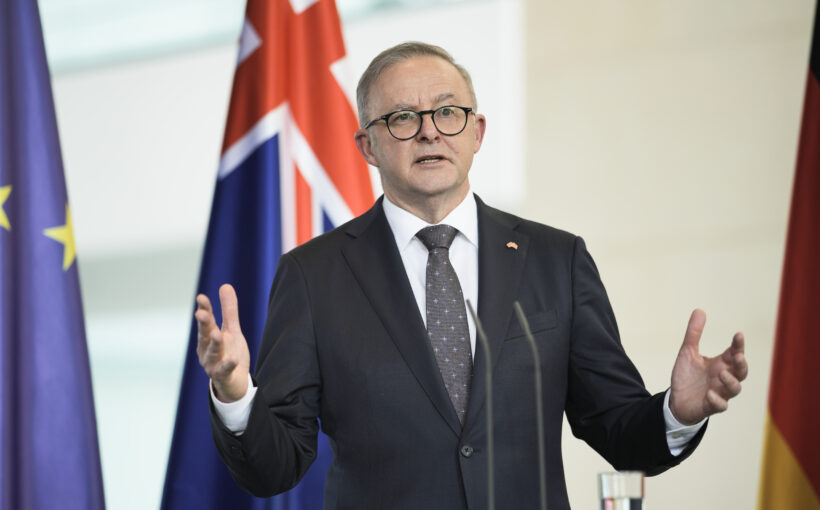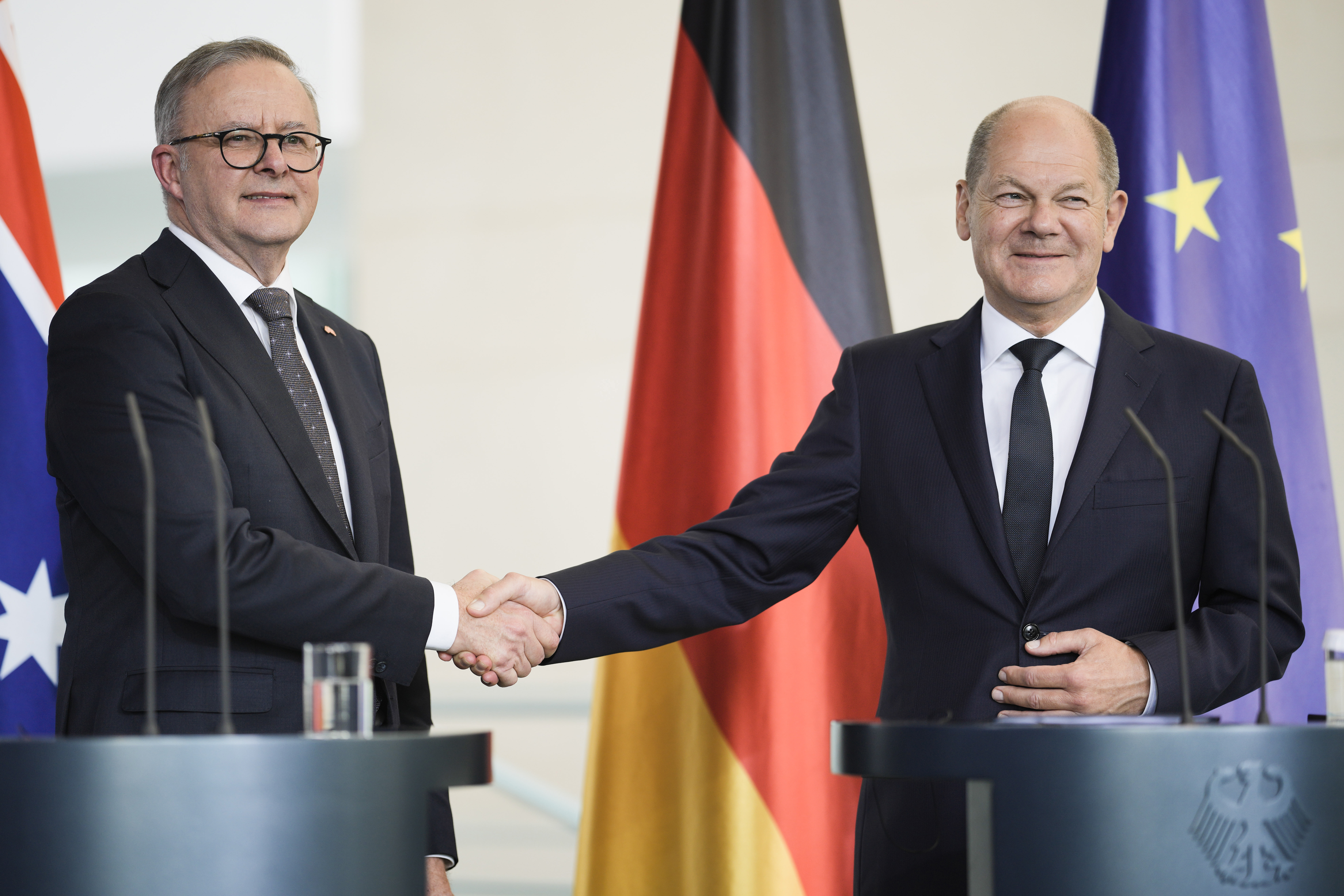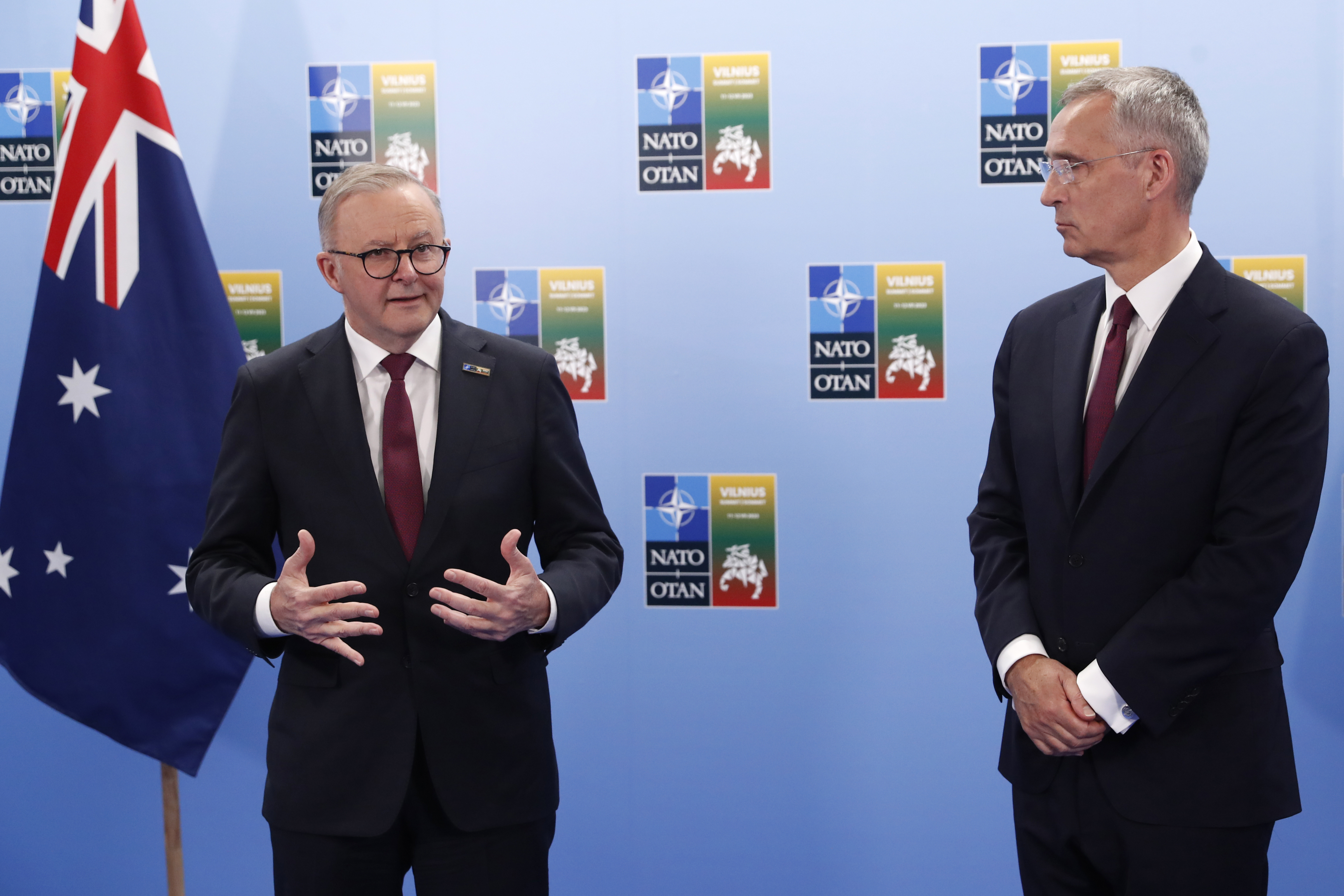Prime Minister Anthony Albanese has touched down in Lithuania to join a NATO summit discussing the war close by in Ukraine.
Tensions heightened ahead of the meeting after Ukrainian President Volodymyr Zelenskyy on Tuesday blasted the absence of a timetable for his country’s membership in the transatlantic alliance as “absurd”.
Allies hope to resolve the seesawing negotiations and leave Vilnius with a clear path forward for the alliance and its support for Ukraine.
Albanese is one of a handful of non-NATO leaders invited to the talks as NATO seeks to expand its reach in the Asia-Pacific.
New Zealand Prime Minister Chris Hipkins, Japanese Prime Minister Fumio Kishida and South Korean President Yoon Suk Yeol are also in Europe for summit, for the second year in a row.
Former prime minister Paul Keating launched a blistering attack on the efforts earlier this week, labelling Secretary-General Jens Stoltenberg a “supreme fool” for the alliance’s efforts to contain China.
But Albanese said Australia’s security and stability were best served by having a “seat at the table” with the country’s “friends” in NATO.
“This seat at the table is one that’s a recognition of Australia’s contribution and the fact that we are a significant player when it comes to defending democracy, defending the rule of law,” he said on Tuesday.
Earlier, the PM made his mark in Germany, locking in deals on climate, trade and defence.
Amid the pageantry and pleasantries in the German capital, the Albanese made a minor misstep on the red carpet while inspecting the troops but was saved by German Chancellor Olaf Scholz.
On security though, the pair were stride for stride.
“Australia comes to Germany as a partner,” Albanese said.
“A partner in solidarity with Ukraine.”
And it will soon be the same in the skies when an Australian E-7A Wedgetail surveillance and combat coordination aircraft is deployed to the Ramstein air base in Germany, along with 100 crew to fly missions in support of NATO across Europe.
“This aircraft will help protect the multinational logistics hub that is essential to flow of military and humanitarian assistance to the people of Ukraine,” the Australian PM said.
He vowed Australia’s aircraft won’t fly in Ukrainian airspace but will help the cause.
“I am really moved,” Scholz said.
“It’s a very important step and a very good one.”
The initial deployment will be six months.
For now it is just one aircraft but it is Australia’s most direct assistance to NATO’s effort in Ukraine, further tying us closer to the world’s most powerful alliance.
“This is a very welcome and substantive announcement and makes a tangible contribution to the war effort,” Shadow Home Affairs Minister James Paterson said.
But in Vilnius, Zelenskyy’s broadside could renew tensions after a burst of goodwill when Turkey agreed to advance Sweden’s bid to join NATO.
Officials have drafted a proposal, which has not been publicly released, on Ukraine’s potential membership. US President Joe Biden expressed support during a meeting with Stoltenberg, but Zelenskyy wrote on Twitter that he was not satisfied.
“We value our allies,” he said but added that “Ukraine also deserves respect.”
We value our allies. We value our shared security. And we always appreciate an open conversation.
Ukraine will be represented at the NATO summit in Vilnius. Because it is about respect.But Ukraine also deserves respect. Now, on the way to Vilnius, we received signals that…
— Володимир Зеленський (@ZelenskyyUa) July 11, 2023
“It’s unprecedented and absurd when time frame is not set neither for the invitation nor for Ukraine’s membership,” Zelenskyy said.
He finished with, “Uncertainty is weakness. And I will openly discuss this at the summit.”
Zelenskyy is expected to meet with Biden and other NATO leaders on Wednesday.
There have been sharp divisions within the alliance over Ukraine’s desire to join NATO, which was promised back in 2008 even though few steps were taken toward that goal.
Stoltenberg wrote in Foreign Affairs on Monday that the alliance would “upgrade our political ties” by forming a NATO-Ukraine Council, which would be “a platform for decisions and crisis consultation”.
In addition, he said Tuesday that NATO would forgo requiring “membership action plan” for Ukraine, removing another hurdle.
But that did not seem to alleviate Zelenskyy’s concerns. In addition, the Baltic states – including hosts Lithuania – have pushed for a strong show of support and a clear pathway toward membership for Ukraine.
However, the United States and Germany were urging caution. Biden said last week that Ukraine wasn’t ready to join. Members of NATO, he told CNN, need to “meet all the qualifications, from democratisation to a whole range of other issues”, a nod toward longstanding concerns about governance and corruption in Kyiv.
In addition, some fear that bringing Ukraine into NATO would serve more as a provocation to Russia, which marked the start of the summit with an hour-long barrage of Kyiv, than as a deterrence against aggression.
The US promises a positive outcome for Ukraine and a new round of support for the war effort but it’s a brutal reminder of the enormity of the stakes of the discussions about to take place on the border of where East meets West.
Kremlin spokesman Dmitry Peskov told reporters NATO’s expansion was “one of the reasons that led to the current situation”.
“It looks like the Europeans don’t understand their mistake,” Peskov said.
He warned against putting Ukraine on a fast track for NATO membership.
“Potentially it’s very dangerous for the European security, it carries very big risks,” Peskov said.
Albanese has met with Stoltenberg and will later meet French President Emmanuel Macron.







